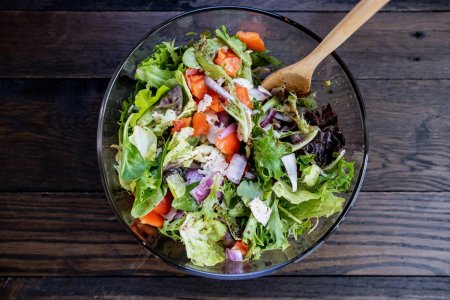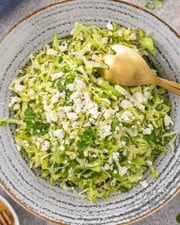Uncover what food safety insiders avoid: E. coli risks in your fridge!
By
Aubrey Razon
- Replies 0
In the vibrant gardens of our kitchens, a hidden threat may be lurking. E. coli could be contaminating the fresh produce you love.
The GrayVine is here to empower you with crucial information to keep your meals safe!
A recent E. coli outbreak, which has affected at least 75 individuals and tragically claimed a life, serves as a stark reminder of the potential dangers associated with certain types of fresh produce.
Food safety experts, with years of experience studying the patterns of foodborne illnesses, have voiced their personal precautions when it comes to raw fruits and vegetables.
Their insights offer a roadmap for those of us who wish to navigate the risks without compromising on the joys of fresh produce.
Sprouts, bagged salad greens, and cantaloupe have been singled out by food safety connoisseurs as items they tend to avoid.
The reasons are rooted in the nature of these foods and the processes they undergo before reaching our plates.
Sprouts, for instance, are grown in warm, moist environments that are ideal for bacterial growth.
Don Schaffner, a professor of food science at Rutgers University explained that “[t]he seeds are exposed to warm temperatures and, as they sprout, release nutrients into the water that allow bacteria to grow.”
Bagged salad greens, although convenient, can harbor bacteria in the very moisture that keeps them crisp.
Barbara Kowalcyk, director of the Institute for Food Safety and Nutrition Security at the George Washington University Milken Institute School of Public Health shared one of her personal practices when it comes to ensuring food safety.
“Any leaf that is torn or damaged, I just throw it away, because that’s how the bacteria can get in there,” she said. “And I usually take the outer leaves off and discard them.”
Cantaloupe, with its rough, webbed rind, can conceal bacteria in its nooks and crannies, making it difficult to clean thoroughly.
“We’ve done research to show that the physical appearance of it doesn’t change, but it can grow bacteria like nobody’s business,” said Darin Detwiler, a professor of food regulatory policy at Northeastern University.
Schaffner points out that the more handling and processing a food undergoes, the greater the chance for contamination.
This includes the slicing, prewashing, and mixing that many of our grocery store items undergo.
Each step is an opportunity for bacteria to be introduced or spread, turning a simple bag of prewashed lettuce into a potential health hazard.
When fruits and vegetables are served uncooked, there's no heat treatment to kill off lurking bacteria.
This has led to numerous E. coli outbreaks in the past, such as the infamous 2006 incident involving prepackaged baby spinach.
The absence of cooking makes raw produce a beautiful, yet potentially dangerous, part of our diets.
Kowalcyk opts for whole heads of lettuce over bagged greens and practices meticulous washing and drying techniques to reduce the risk of contamination.
She emphasizes the importance of friction in removing bacteria, which can cling stubbornly to the surfaces of our favorite greens.
The experts also caution against rare or undercooked meats, poultry, fish, eggs, and unpasteurized milk.
They remind us that while it's impossible to avoid every item that has been associated with foodborne illness, being informed and cautious can significantly reduce the risks.
Despite the risks, each outbreak brings with it valuable lessons and improvements in food safety practices.
Kali Kniel, a professor of microbial food safety, assures us that the food industry learns and adapts with each incident, striving to minimize future risks.
1. Be Selective: Consider avoiding or thoroughly cleaning items like sprouts, bagged salad greens, and cantaloupe.
2. Practice Good Hygiene: Wash all produce under running water and use clean towels to dry them, applying friction to dislodge bacteria.
3. Stay Informed: Keep up with food safety news and recalls to be aware of current risks.
4. Trust Your Instincts: When dining out, use the cleanliness of the establishment as a gauge for their food safety practices.
Remember, while the world of fresh produce is a treasure trove of nutrients, it's also a domain where vigilance is key.
By staying informed and adopting safe food practices, we can continue to enjoy the bounty of our gardens with peace of mind.
Let's keep our fridges—and our plates—safe from the hidden dangers of E. coli.
 Have you changed your eating habits due to food safety concerns? Do you have any tips or tricks for ensuring the produce you eat is as safe as possible? Share your experiences and advice with us in the comments below. Let's cultivate a community of informed and healthy eaters, one bite at a time.
Have you changed your eating habits due to food safety concerns? Do you have any tips or tricks for ensuring the produce you eat is as safe as possible? Share your experiences and advice with us in the comments below. Let's cultivate a community of informed and healthy eaters, one bite at a time.
The GrayVine is here to empower you with crucial information to keep your meals safe!
A recent E. coli outbreak, which has affected at least 75 individuals and tragically claimed a life, serves as a stark reminder of the potential dangers associated with certain types of fresh produce.
Food safety experts, with years of experience studying the patterns of foodborne illnesses, have voiced their personal precautions when it comes to raw fruits and vegetables.
Their insights offer a roadmap for those of us who wish to navigate the risks without compromising on the joys of fresh produce.
Sprouts, bagged salad greens, and cantaloupe have been singled out by food safety connoisseurs as items they tend to avoid.
The reasons are rooted in the nature of these foods and the processes they undergo before reaching our plates.
Sprouts, for instance, are grown in warm, moist environments that are ideal for bacterial growth.
Don Schaffner, a professor of food science at Rutgers University explained that “[t]he seeds are exposed to warm temperatures and, as they sprout, release nutrients into the water that allow bacteria to grow.”
Bagged salad greens, although convenient, can harbor bacteria in the very moisture that keeps them crisp.
Barbara Kowalcyk, director of the Institute for Food Safety and Nutrition Security at the George Washington University Milken Institute School of Public Health shared one of her personal practices when it comes to ensuring food safety.
“Any leaf that is torn or damaged, I just throw it away, because that’s how the bacteria can get in there,” she said. “And I usually take the outer leaves off and discard them.”
Cantaloupe, with its rough, webbed rind, can conceal bacteria in its nooks and crannies, making it difficult to clean thoroughly.
“We’ve done research to show that the physical appearance of it doesn’t change, but it can grow bacteria like nobody’s business,” said Darin Detwiler, a professor of food regulatory policy at Northeastern University.
Schaffner points out that the more handling and processing a food undergoes, the greater the chance for contamination.
This includes the slicing, prewashing, and mixing that many of our grocery store items undergo.
Each step is an opportunity for bacteria to be introduced or spread, turning a simple bag of prewashed lettuce into a potential health hazard.
When fruits and vegetables are served uncooked, there's no heat treatment to kill off lurking bacteria.
This has led to numerous E. coli outbreaks in the past, such as the infamous 2006 incident involving prepackaged baby spinach.
The absence of cooking makes raw produce a beautiful, yet potentially dangerous, part of our diets.
Kowalcyk opts for whole heads of lettuce over bagged greens and practices meticulous washing and drying techniques to reduce the risk of contamination.
She emphasizes the importance of friction in removing bacteria, which can cling stubbornly to the surfaces of our favorite greens.
The experts also caution against rare or undercooked meats, poultry, fish, eggs, and unpasteurized milk.
They remind us that while it's impossible to avoid every item that has been associated with foodborne illness, being informed and cautious can significantly reduce the risks.
Despite the risks, each outbreak brings with it valuable lessons and improvements in food safety practices.
Kali Kniel, a professor of microbial food safety, assures us that the food industry learns and adapts with each incident, striving to minimize future risks.
1. Be Selective: Consider avoiding or thoroughly cleaning items like sprouts, bagged salad greens, and cantaloupe.
2. Practice Good Hygiene: Wash all produce under running water and use clean towels to dry them, applying friction to dislodge bacteria.
3. Stay Informed: Keep up with food safety news and recalls to be aware of current risks.
4. Trust Your Instincts: When dining out, use the cleanliness of the establishment as a gauge for their food safety practices.
Remember, while the world of fresh produce is a treasure trove of nutrients, it's also a domain where vigilance is key.
By staying informed and adopting safe food practices, we can continue to enjoy the bounty of our gardens with peace of mind.
Let's keep our fridges—and our plates—safe from the hidden dangers of E. coli.
Key Takeaways
- An E. coli outbreak linked to certain types of fresh produce underscores the contamination risk with these foods, according to food safety experts.
- Experts, including professors, often avoid raw sprouts, bagged salad greens, and cantaloupe due to the potential for bacterial contamination.
- Food safety professionals urge caution with produce handling and processing, as these stages can introduce or spread bacteria, making some foods riskier than others.
- Even though improvements in agriculture have reduced the spread of pathogens, experts encourage consumers to be aware of the E. coli risk especially for vulnerable populations, and they stress the importance of proper food handling and cooking practices at home and in restaurants.







